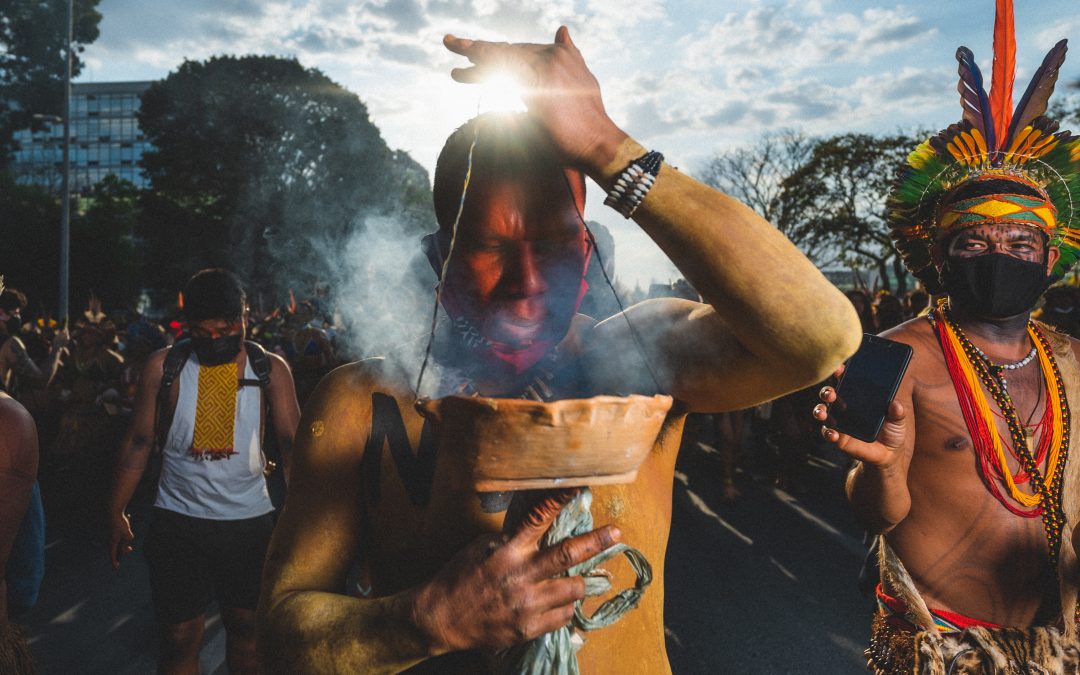
31/Aug/2021
Foto @cicerone.bezerra
The session is scheduled to start at 2 pm (GMT-3), with oral statements by the parties involved in the process; indigenous peoples are mobilized in Brasília and in the territories to follow the judgment
Scheduled to start at 2:00 PM (GMT-3) on Wednesday, September 1st, the Brazilian Supreme Court (STF) resumes the judgment on the “milestone thesis” for the demarcation of Indigenous Lands (TIs), suspended last Thursday ( 26) after the presentation by the Justice Edson Fachin of his report. Still last Thursday, the President of the Court, Luiz Fux, confirmed the case would be resumed as the first item on the Court schedule, as it configures a “very relevant” issue and must have a decision this week or in the “following days”.
With the report already presented, the session will be resumed with the argumentation by the parties of the process: from the Attorney-General of the Union (AGU), representing the Union; lawyers from the Xokleng community, from TI Ibirama-LaKlãnõ (SC), target of the original action; the Institute for the Environment of the state of Santa Catarina (IMA), which proposed the action; in addition to the Attorney General’s Office (PGR), which is required to manifest itself in lawsuits involving indigenous issues. AGU, PGR and the parts of the process will each have 15 minutes of speech.
Then, there should be 34 speeches by the amici curiae – “friends of the Court”, which are organizations that deal directly with the issues under analysis, and, from this position, may bring relevant points of view to support the Justices to make their decision.
21 amici curiae are registered to speak in favor of the rights of indigenous peoples. They are indigenous lawyers, including Apib’s attorney – Eloy Terena, and indigenists, socio-environmental and human rights organizations and institutions; and 13 contrary, linked to agribusiness representations and entities. Each speech will last five minutes.
“Reading the report is already an extremely important step. It was a detailed report by the Justice Edson Fachin, which brings up the major issues involved in the procedural dispute in this extraordinary appeal: the possession links regarding the areas of traditional indigenous occupation, in the light of article 231 of our Federal Constitution”, highlights Rafael Modesto, legal advisor to the Indigenous Missionary Council (Cimi) and lawyer for the Xokleng people in the case.
The oral presentations by the parties, the AGU, the PGR and the amici curiae are expected to take almost the entire Wednesday afternoon. In the sequence, the first minister to read his vote should be the rapporteur, Edson Fachin.
The native peoples, indigenous organizations and indigenists hope the rapporteur, Edson Fachin, who has already presented his vote when the process was in the Virtual Plenary, will “bring a vote similar or identical to that he had already presented, against the ‘milestone’ thesis’. The thesis is rejected by indigenous peoples, support organizations and civil society, artists, intellectuals, society as a whole.
We defend the original law, associated to the ‘thesis of indigenato’, which is the will of the original constituent of 1988”, reinforces the Xokleng people’s lawyer.
After Fachin, the other nine ministers must submit their votes. They can still request a new suspension of the process to analyze it better, the so-called request for “views”.
Disputed theses
The Court will analyze the repossession action filed by the government of Santa Catarina against the Xokleng people, referring to the TI Ibirama-Laklãnõ, where the Guarani and Kaingang peoples also live. The case received, in 2019, the status of “general repercussion”, which means that the decision will serve as a guideline for the federal administration and all instances of Justice with regard to demarcation procedures.
At the heart of the dispute are two theses:
The so-called “milestone” thesis, a ruralist thesis that restricts indigenous rights. According to this interpretation, considered unconstitutional, indigenous peoples would only have the right to the lands that were in their possession on October 5, 1988, date of the Constitution promulgation. This thesis is defended by companies and economic sectors that are interested in exploring and appropriating indigenous lands.
Opposed to the milestone thesis is the “theory of indigenato”, enshrined in the Federal Constitution of 1988. According to it, the indigenous right to land is “original”, that means it predates the formation of the Brazilian State itself, regardless of a date specific proof of land ownership (“milestone”) and even the administrative procedure of territorial demarcation. This thesis is defended by indigenous peoples and organizations, indigenists, environmentalists and human rights organizations.
“Our history did not begin in 1988, and our struggles are millenial, that is, they have persisted since the Portuguese and successive European invaders landed in these lands to take over our territories and their wealth”, the indigenous movement reaffirms in a note published in the Saturday (28). Indigenous people also ensure that they continue “resisting, claiming respect for their way of seeing, being, thinking, feeling and acting in the world”.
Indigenous mobilization
Last week, six thousand indigenous people from 176 peoples from all regions of the country were gathered in Brasilia in the “Struggle for Life” camp to follow the trial by the Supreme Court and to demand their rights, also protesting against the anti-indigenous agenda implemented by Bolsonaro’s government and by the National Congress, in the largest indigenous mobilization in the last 30 years.
After the beginning of the trial and the forecast that it would be resumed this Wednesday (1st), the indigenous people decided to keep the mobilization in Brasília and in the territories. Thus, around a thousand indigenous leaders, representing their peoples, remained in Brasília, and the “Struggle for Life” camp was transferred to a new location.
In the early afternoon of this Wednesday (1st), the indigenous peoples who remain in Brasília will leave the camp marching towards the Praça dos Três Poderes, where they will follow the trial by the STF.
Following the sanitary protocols to combat Covid-19, the group will remain until September 2nd and later join forces with the Second March of Indigenous Women, which takes place between September 7th and 11th.
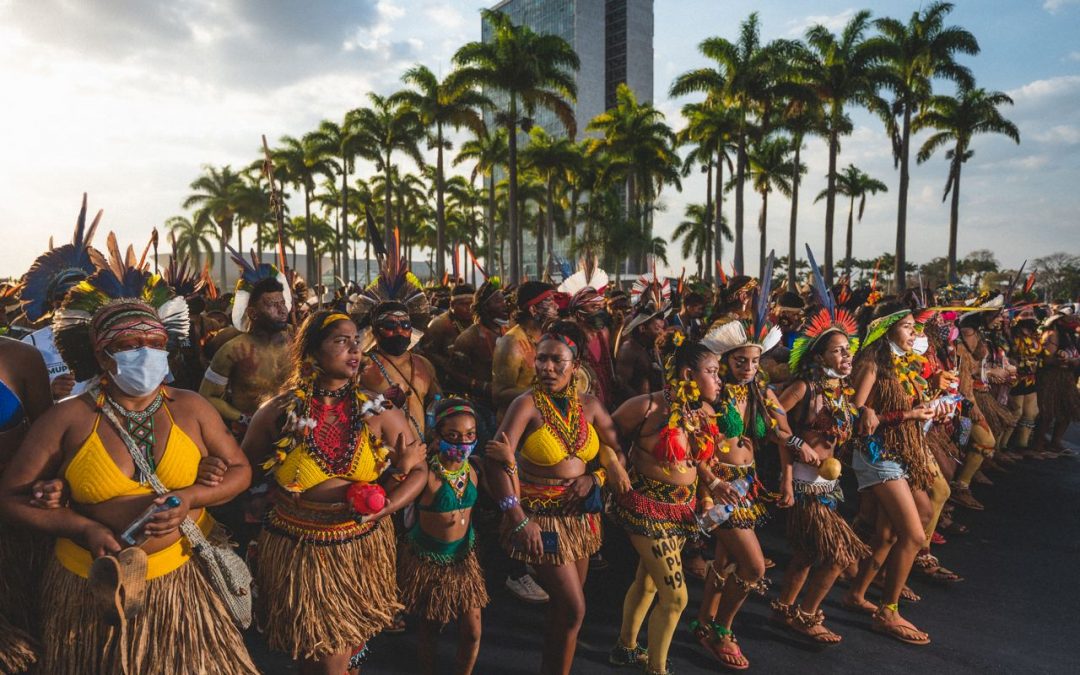
30/Aug/2021
In memory of our ancestors, who gave us their lives so we can exist. In memory of the ‘encantados’ (enchanted spirits) who brought us here to continue their struggle in defense of our bodies, lands and territories, our identity and differentiated cultures, we communicate Brazilian and international societies that we will remain permanently mobilized in defense of LIFE and DEMOCRACY.
Our fight is not just to preserve the lives of our peoples but of the entire humanity, today seriously threatened by the policy of extermination and devastation of Mother Nature promoted by economic elites – who inherited the greed of colonial, mercantile and feudal expansionist power – and by governors like the genocidal Jair Bolsonaro.
The Articulation of Indigenous Peoples of Brazil (Apib) started the Struggle for Life camp in Brasília on August 22nd and reinforces in this letter that we will remain mobilized until September 2nd, 2021 to fight for our rights. Today, this is the greatest mobilization in the history of the original peoples, in the Federal Capital, and it reinforces our statement: our history does not begin in 1988!
Even putting our lives at risk, in the still seriously dangerous context of Covid19, we are here to tell the invaders of our territories that they will not pass, despite the intense attacks on our fundamental rights guaranteed by the Federal Constitution of 1988.
We occupied the media, the streets, the villages and Brasília to fight for democracy, against the racist and anti-indigenous agenda that is being implemented by the Federal Government and the National Congress and to monitor the judgment in the Supreme Court (STF), which will define the future of our peoples.
During the month of June 2021, we carried out the Rise for the Earth, inaugurating our first on-site activities (after the pandemic), in Brasília, to face the worsening of violence against indigenous lives. From then on, we started a new cycle of struggles, considering that, since March 2020, we only gathered virtually and within our territories, due to the pandemic.
As we face many viruses, including Bolsonaro’s genocidal policy, we started our ‘Indigenous Spring’ that intends to occupy Brasília constantly, in 2021, in addition to continuing on social networks and in mobilized territories.
From the 7th to the 11th of September, indigenous women will be on the front line to bury once and for all the Milestone thesis, during the Second March of Indigenous Women: the original women reforesting minds for the healing of the Earth.
On the 26th, the STF began the judgment that will define the demarcation of Indigenous Lands (TIs). With no end in sight, the indigenous peoples are still mobilized to monitor the outcome of the votes of the Justices of the Supreme Court.
We will fight to the end to maintain our original right to the lands that we traditionally occupy and protect. Being part of this country, maintaining our condition as culturally differentiated peoples, even if public authorities and private corporations consider us obstacles to development. This development, which since the beginnings of the European invasion has been devastating, ethnocidal, genocidal and ecocidal, and which in current times has found, and not by chance, in this misgovernment, a prototype to perpetuate its project of domination.
We are children of the Earth! And the Earth is not ours, we are the ones who are part of it. It is the uterus that generates us and the arms that welcomes us. That’s why we give her our life! In our tradition there has never been this issue of regulating who owns the land or not, as our relationship with it was never of possession. Our possession is collective as it is the usufruct. This is the basic foundation of our existence, which is not yet understood by the ignorance of the so-called Western civilization culture, even after 521 years.
This contradiction is at the base of the disputes that the invaders’ heirs or descendants insist on keeping against us. They relentlessly dispute our territories without truce, during the different phases of the formation and configuration of the Brazilian National State and nowadays!
Neocolonial elites, also promoters and beneficiaries of the military dictatorship, took over most of the current National Congress and continue to defend the continuity of their hegemonic control, domination over bodies, lands and territories and not just indigenous peoples. They intend to make us believe that they are going to bring development to Brazil, when, in fact, they are promoting a Project for the Death of Mother Nature – of forests, rivers, biodiversity – and for the peoples and cultures holding millenary accumulated wisdom, outside the scientific institutions. According to the most recent data from the UN Panel on Climate Change, there is an undeniable increase in the planet’s temperature, floods, among other environmental disasters, obviously caused by this development model.
Considering all this factors, we say NO to any and all initiatives that ignore our historic and strategic protection of life, humanity and the planet. We also say NO to all those who propose to violate our rights through hundreds of administrative, legal, legislative and legal actions.
Our history did not begin in 1988, and our struggles are millennial, in other words, they have persisted since the Portuguese and successive European invaders arrived in these lands to take over our territories and their wealths. That is why we will continue to resist, claiming respect for our way of seeing, being, thinking, feeling and acting in the world.
Under the aegis of the Constitutional text, we trust that the Supreme Court will reinforce our original right to land, which does not depend on a specific date of occupation proof, as defended by the invaders. Through the Milestone thesis, the current colonizers want to ignore that we were already here when their ascendants decimated many of our ancestors, raising the current national state over their corpses.
Supported by our ancestry and the power of our peoples, our spirituality and the strength of our enchanted spirits who cherish the Bem Viver (Good Living), ours and humanity’s, we say no to the Milestone thesis! We call the national and international societies, especially the different organizations and social movements that have always been with us, and above it all, our bases, peoples and indigenous organizations to remain vigilant and mobilized in defense of our rights.
Brasília – DF, August 27, 2021.
Struggle for Life Camp
Articulation of Indigenous Peoples of Brazil – APIB
National Indigenous Mobilization – MNI
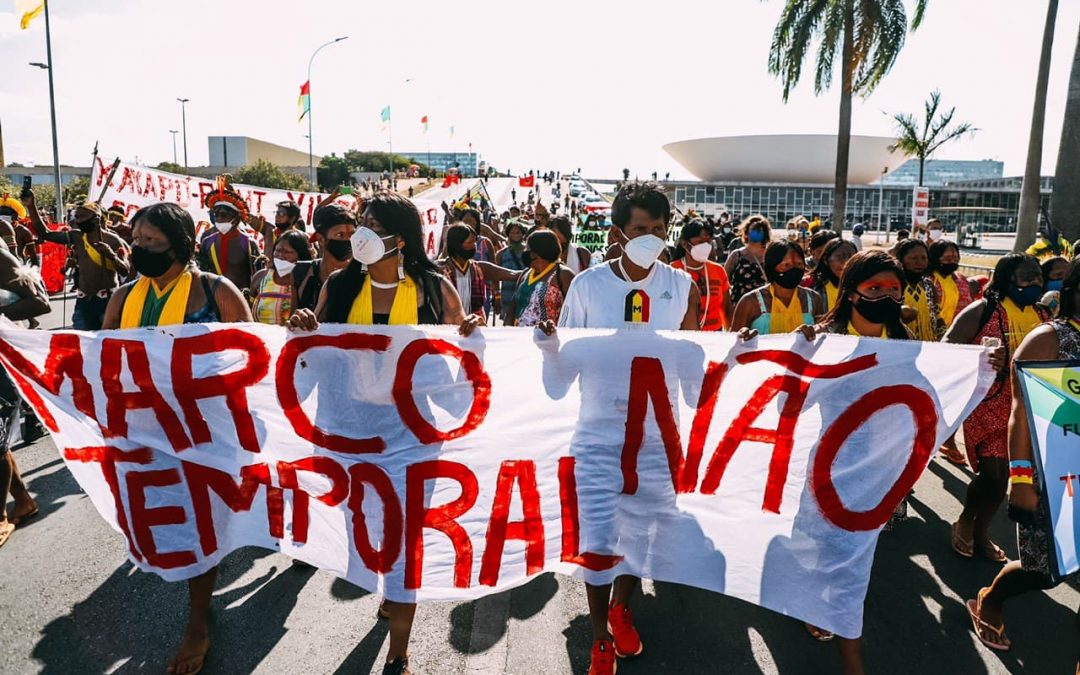
26/Aug/2021
Foto: Raissa Azeredo | Aldeia Multietnica
On the day the Federal Supreme Court (STF) resumes the trial that will define the future of the demarcation of indigenous lands in Brazil, understand once and for all what the Milestone thesis is
Today, the Federal Supreme Court resumes the trial of the Xokleng case, in an Extraordinary Appeal filed by the Government of Santa Catarina. What is in the hands of the 11 ministers of the STF is the future of the demarcation of indigenous lands in Brazil. This is because the main issue involved in this judgment is the Temporal Framework, a thesis that also permeates some bills being voted on in the National Congress.
Indigenous peoples have been repeating for quite some time that, if validated, the Milestones thesis could seriously compromise the process of demarcation of indigenous lands in Brazil, and even serve as an excuse to cancel demarcation processes that have already been concluded.
But after all, do you know what the Milestone Thesis (Marco Temporal) is?
The Milestone thesis is a legal thesis that restricts the constitutional rights of indigenous peoples. In this interpretation, defended by ruralists and sectors interested in the exploitation of traditional lands, the indigenous peoples would only have the right to demarcation of the lands that were under their possession on October 5, 1988 – the promulgation date of the Brazilian Constitution. Alternatively, if they were not in possession of the land, they would have to prove the existence of a judicial dispute or material conflict on the same date of 5 October 1988.
The thesis is perverse because it legalizes and legitimizes the violence to which the peoples were subjected until the promulgation of the 1988 Constitution, especially during the Military Dictatorship. Furthermore, it ignores the fact that, until 1988, the indigenous peoples were under the guardianship of the State and did not have the autonomy to judicially fight for their rights. For all these reasons, the indigenous peoples have been saying in demonstrations and mobilisations: “Our history does not begin in 1988!
Why is the STF debating this issue today?
The debate on the Milestone thesis arrived at the STF as a thesis presented by the Government of Santa Catarina in the Extraordinary Appeal (RE) 1.017.365. The object of the case is a repossession suit filed by the Environmental Institute of Santa Catarina (IMA) against the National Indian Foundation (FUNAI) and the Xokleng indigenous people, involving an area claimed by the Ibirama-Laklanõ Indigenous Territory. The territory in dispute was reduced throughout the 20th century and the indigenous people have never stopped claiming it. The area has already been identified by anthropological studies by Funai and declared by the Ministry of Justice as part of their traditional land.
Why is this trial central to the future of indigenous peoples in Brazil?
In a decision on 11 April 2019, the plenary of the STF unanimously recognised that this case has “general repercussion” status. This means that the decision made in that case will serve to fix a reference thesis for all cases involving indigenous lands, in all instances of the Judiciary from now on.
And does this decision affect many people?
Besides the peoples that inhabit the Ibirama-Laklanõ Indigenous Lands, the object of the lawsuit, this decision will impact dozens of land demarcation cases and territorial disputes over Indigenous Lands that are currently in the courts. There are also many legislative measures that seek to remove or relativize the constitutional rights of indigenous peoples. By admitting the general repercussion, the STF also recognises that there is a need for a definition of the theme.
What is at stake?
Ultimately, what is at stake is the recognition or denial of the most fundamental right of indigenous peoples: the right to land. Indigenous peoples have an interdependent relationship with their lands, as their cosmologies link their very existence to the connection with the land. Furthermore, it cannot be ignored that those who defend the Milestone thesis intend, in reality, to expel the original occupants of the lands in order to destroy and exploit them to exhaustion. And this directly impacts the ecological and climatic balance of our country and world.
What consequences could this trial have for the indigenous peoples?
If the STF reaffirms the original character of indigenous rights and, therefore, definitively rejects the thesis of the temporal milestone, hundreds of conflicts throughout the country will have a path open to their solution, as well as dozens of lawsuits could be immediately resolved. The 310 indigenous lands that are stalled at some stage in the demarcation process would, in theory, no longer have any barriers for their administrative processes to be concluded.
On the other hand, if the STF opts for the anti-indigenous thesis of the temporal milestone, it will end up legalising the usurpations and violations that occurred in the past against the indigenous peoples. In this case, a flood of other decisions annulling demarcations can be foreseen, with the consequent rise of conflicts in pacified regions and the worsening of conflicts in areas already under attack.
This decision could also encourage a new process of invasion and dispossession of demarcated lands – a situation that is already underway in various regions of the country, especially in the Amazon region.
In addition, there are references to isolated indigenous peoples who have not yet been confirmed by the State, that is, they are still being studied – a lengthy procedure, due to the non-contact policy. If the time limit of 1988 is approved, many lands of isolated peoples will not be recognized, opening up the possibility of the extermination of these peoples.
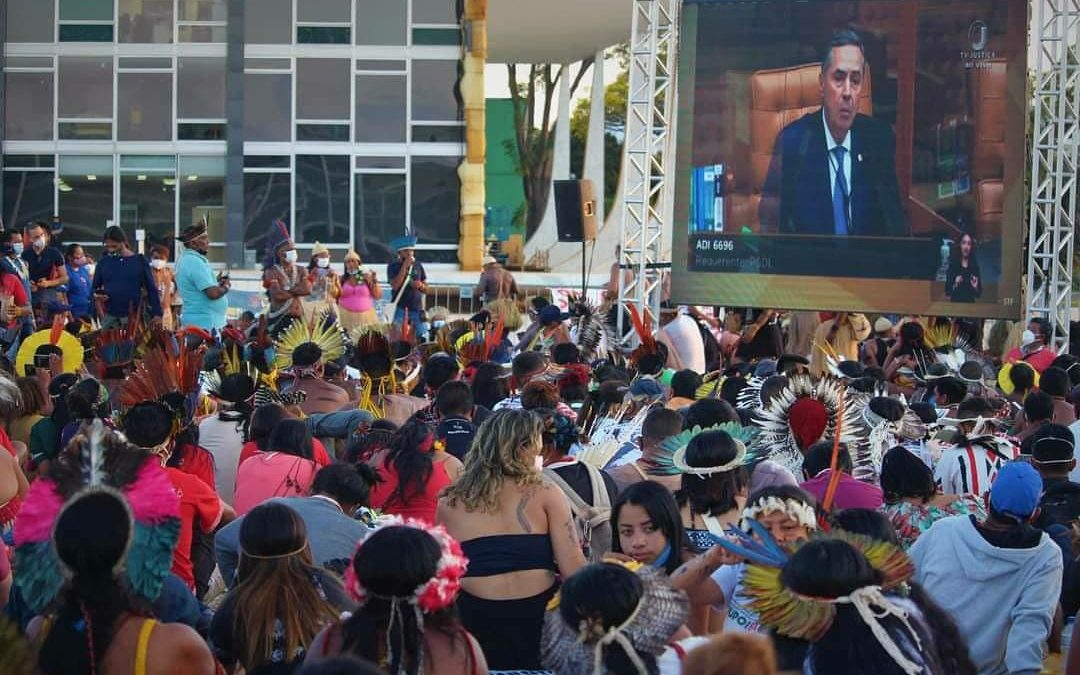
25/Aug/2021
Photo: Daniela HubertyComin
For the fourth time in two months, the STF does not judge a case that could define the future of indigenous peoples; the trial must begin on Thursday 26
The trial of the general repercussion on demarcations of indigenous lands, which was scheduled to enter the agenda of the Federal Supreme Court (STF), on Wednesday, 25, was postponed to tomorrow, Thursday, 26. This is the fourth time in two months that the process that can define the future of indigenous peoples has been put on the agenda and not judged by the Supreme Court.
The mobilisation of the indigenous peoples continues, with the expectation that the process will finally be voted on, that the STF reaffirm the constitutional rights of indigenous peoples and rule out any possibility of restriction or reversal of what was guaranteed by the Federal Constitution of 1988.
The approximately 6,000 indigenous people who have been in Brasilia, in the Struggle for Life camp, since 22 August, continue mobilising to follow the trial in the Supreme Court and protest against the anti-indigenous agenda in the National Congress and the federal government.
History
On June 11, the trial even began in virtual plenary session, but was suspended by a request for a “highlight” by Minister Alexandre de Moraes, one minute after it began. The trial was rescheduled for June 30, but the ministers did not get to start due to lack of time and was postponed to June 31. That same week, the analysis of the case was rescheduled by the president of the Court, Minister Luiz Fux, who included the tria in the agenda for 25 August.
Now, the forecast is that the process is voted on Thursday (26). The session begins at 2pm (Brasília time) and the Supreme Court will analyse the repossession action filed by the government of Santa Catarina against the Xokleng people, regarding the Ibirama-Laklãnõ IT, where the Guarani and Kaingang peoples also live. In 2019, the STF gave “general repercussion” status to the process, which means that the decision made in this case will serve as a guideline for the federal approach and all instances of Justice with regard to demarcation procedures.
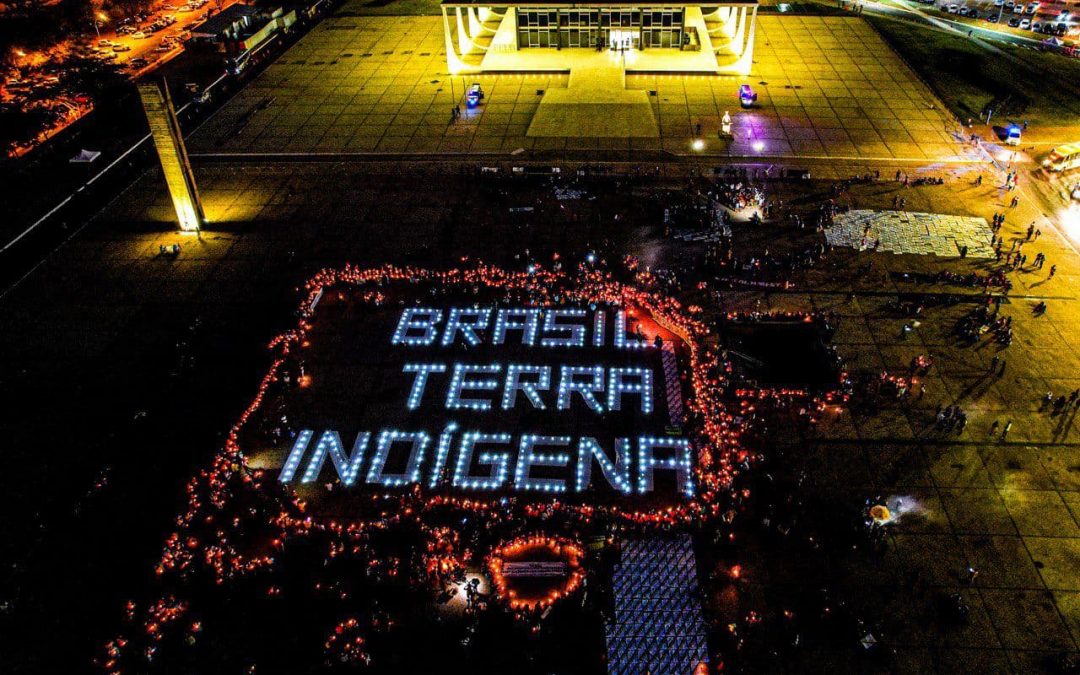
24/Aug/2021
Photo: Scarlett Rocha
More than 6,000 indigenous people came to Brasilia at one of the most serious moments ever experienced by indigenous peoples, to demand respect and a guarantee of their rights.
For 521 years, we, the Indigenous Peoples of Brazil, have lived and experienced the meaning of struggle. We struggle to survive, to be respected by a State that despises our existence, usurps our traditional territories, and relegates us to a condition of sub-citizenship. The legacy of the colonial past is persistent and violent, and today it gains support and new impetus under the management of Jair Bolsonaro, the president of the Republic who elected us as priority enemies even before his inauguration.
The history of the indigenous movement in Brazil is a history of struggle and resistance, constant mobilization and innovation, and the search for the construction of bridges and alliances between our 305 peoples, who live in all regions of the country. Such ethnic, geographic, cultural, and linguistic diversity, besides being an inestimable richness, also becomes a challenge when one seeks unity in the struggle. To overcome this difficulty, which is reinforced and exploited by enemies who artificially try to divide and forge disputes and oppositions among our relatives, we renew our alliance from our shared ancestry.
The struggle for life, the motto of the camp that now gathers 6.000 indigenous people in Brasilia, is established as a necessity and an urgency for us, original people, as soon as the perverse and genocidal face of the colonialist project was revealed. We have lived in a state of alert since the first European foot stepped on this land, even before it was named Brazil.
It is symptomatic that after five centuries of colonization, we still have to cry out in defense of our lives, as much as our ancestors had to do in the past. The struggle is still the same, but throughout all these years we have accumulated survival technologies and articulation strategies.
We have learned since the time of our ancestors and from our elders that when the enemy tries to subdue us by force and hatred, the most powerful way to confront the aggressions is to unite. This is what the indigenous movement did in the constituent process of 1988, with the participation of leaders of diverse peoples in the construction of an agenda of rights affirmation. We managed to include part of our demands in the text of the Federal Constitution, which gave us an unprecedented institutional support to advance in the struggle for public policies that would contemplate our specific needs and especially guarantee the demarcation of our indigenous lands.
This, however, was not enough to convince the Brazilian State and a nation – that has not yet pulled out the deepest roots of racism from its culture – that fully respecting us as citizens is not a favor – it is an obligation. Both the Federal Constitution and international treaties to which Brazil is a signatory are categorical in affirming the State’s obligation to demarcate indigenous territories and protect our physical integrity.
Faced with this unending need to reaffirm that our lives matter, when we hold a national mobilization with a historic number of participants, in the midst of the most serious pandemic that the world has faced in centuries, there are two conclusions that run deepest in our hearts.
The first is that the situation is still unfavorable and urgent, and this is one of the factors that brings us massively to Brasilia. Our people can no longer bear to tell stories of death, of fire, of pain, of destruction. We want to tell other stories, we want to talk about our wealth, our cultures, our joy.
And this brings us to the second conclusion: the clear perception that the indigenous movement in Brazil has reached a level of maturity, organicity, and strength that places us definitely as subjects of our own history. Our protagonism is based on centuries of struggle by our ancestors, and on the clarity that there is no more room for silencing. The world is seeing and hearing what is happening to our peoples, and it is we, relatives, who are in control of our narrative!
The record of relatives and numbers of peoples mobilized in Brasilia becomes, therefore, a message to the world, and especially to those forces that insist on trying to violate us: we will not be silenced! Our strength is greater than ever! We are 6 thousands in Brasilia, and we represent all the relatives that continue the struggle in our territories. We are 6 thousands who represent the millions of ancestors who have been erased from history. We are 6 thousands who represent the future of the indigenous peoples of Brazil!
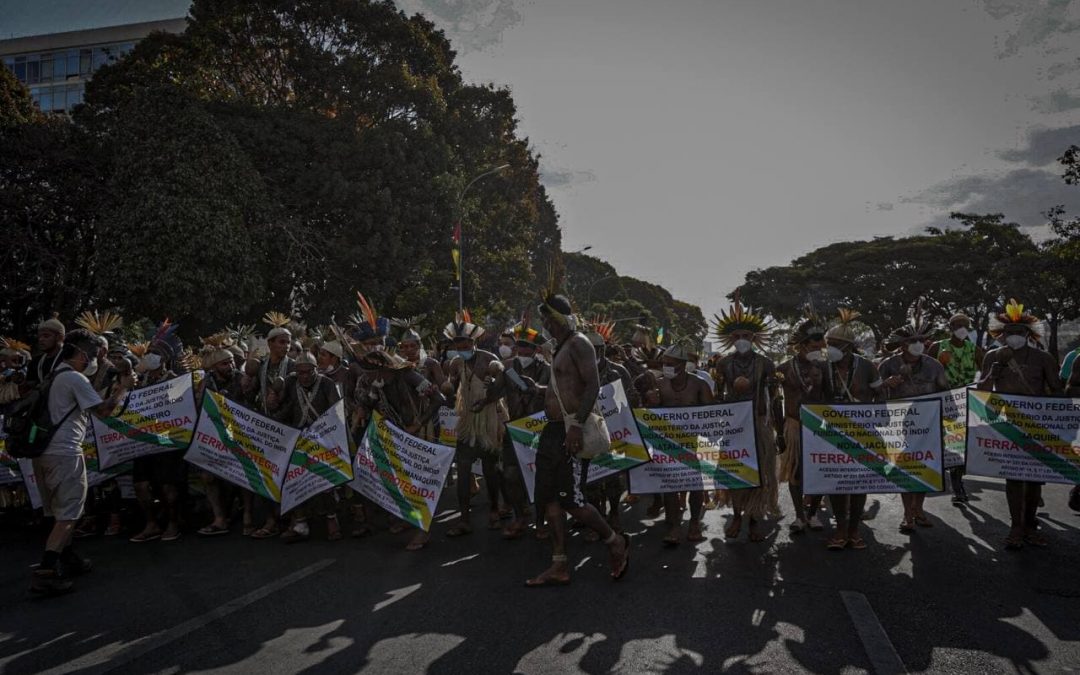
24/Aug/2021
Photo: Scott hill
The international community demands from Brazilian institutions respect for the rights of indigenous peoples and rejects the Milestone thesis, which will be judged by the Supreme Federal Court (STF)
The struggle of the indigenous peoples of Brazil for the respect of their lives and territories has gained relevant international support every day. The Articulation of the Indigenous Peoples of Brazil (Apib) understands the importance of seeking the attention of the world and occupying all possible instances to guarantee respect for their rights, especially in a domestic conjuncture in which Brazilian institutions, which should look after the welfare and guarantee of indigenous peoples rights, are converted into threatening spaces.
Since the beginning of the Bolsonaro government, the attitude of the Brazilian State towards the indigenous peoples has become a policy of death and destruction. The hard-won public policies have been hastily discontinued, indigenous institutions, such as FUNAI, have been politically occupied and their institutional objectives have been distorted. The State has systematically omitted its constitutional duties to protect indigenous peoples, when it has not revealed itself to be an enemy.
In this scenario, international support is even more relevant. The support of partners, international agencies and multilateral bodies draws the attention of the global community to the scenario of constant threats and violence that the indigenous peoples live through in Brazil. Far beyond mobilising international solidarity, however, this movement also provokes Brazilian institutions to move in defence of the native peoples.
Thus, Apib and its regional organisations have received with great satisfaction the support of various international institutions in recent days, especially after the start of the Struggle for Life camp in Brasilia. “We are carrying out the biggest mobilisation of our lives, in Brasilia, because it is our future and that of all humanity that is at stake. Speaking of the demarcation of indigenous lands in Brazil is to speak of guaranteeing the future of the planet with solutions to the climate crisis,” reinforces Sonia Guajajara, executive coordinator of Apib.
On the first day of the mobilisation, the coordination of Apib and representatives of the Yanomami and Munduruku peoples were visited by the Progressive International, an international network of NGOs, political parties, trade unions and other institutions fighting for human rights, in a demonstration of international support. The committee received copies of the International Complaints Dossier launched by APIB last week, as a tool to denounce the anti-indigenous agenda that takes over Brazilian institutions under the Bolsonaro government.
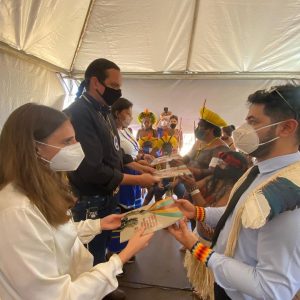
In the coming days, representatives of APIB have an intense agenda of meetings with embassies and diplomatic representations in Brasilia, occasions in which they will present the International Complaints Dossier and dialogue about the necessary support of foreign states to stop the anti-indigenous agenda advancing in Brazil. The meetings began yesterday, with a visit to the Norwegian Embassy, where they were received by Ambassador Nils Martin Gunneng and programme officer Kristian Bengston. This morning, they were received by the French Ambassador, Brigitte Collet.
UN and OAS reinforce the fight against the Milestone thesis
Yesterday (23), the Inter-American Commission on Human Rights (IACHR), an organ of the Organization of American States (OAS), and the UN Special Rapporteur on the rights of indigenous peoples, Francisco Cali Tzay, spoke out against the Milestone thesis, which is being debated by the Federal Supreme Court (STF) within the scope of Extraordinary Appeal (RE) 1.017.365.
The RE deals with a repossession action filed by the state of Santa Catarina against the Xokleng people, regarding the Ibirama-Laklãnõ Indigenous Land (IT), where Guarani and Kaingang indigenous people also live. In 2019, the STF gave “general repercussion” status to the case, which means that the decision made in this case will serve as a guideline for the federal management and all the Justice instances with regard to demarcation procedures. The trial, therefore, will affect the future of all indigenous territories in Brazil.
The UN Rapporteur asked the Supreme Court (STF) to guarantee the rights of indigenous peoples to their lands and territories, and to reject a legal argument promoted by commercial agents in order to exploit natural resources on traditional indigenous lands, referring to the Milestone thesis.
“If the STF accepts the so-called Milestone thesis in its decision on land demarcation later this month, it could legitimize violence against indigenous peoples and intensify conflicts in the Amazon forest and other areas,” said the Rapporteur.
The IACHR expressed its concern over the legal thesis of the “Milestone thesis” and warned that it could have serious effects on the collective property rights of indigenous and tribal peoples in Brazil.
The manifestation published yesterday on the IACHR website addresses in particular the STF requesting the Court to “adopt the necessary measures to review and modify the provisions of the judicial orders or directives, such as the “Milestone thesis”, which are incompatible with the parameters and international obligations regarding the human rights of indigenous and tribal peoples”.
For the OAS body, the application of the Milestone thesis “contradicts international and inter-American human rights standards, in particular the American Convention on Human Rights and the American Declaration on the Rights of Indigenous Peoples. In particular, because it does not take into consideration the countless cases in which indigenous peoples were forcibly displaced from their territories, often with extreme violence, which is why they were not occupying their territories in 1988.”
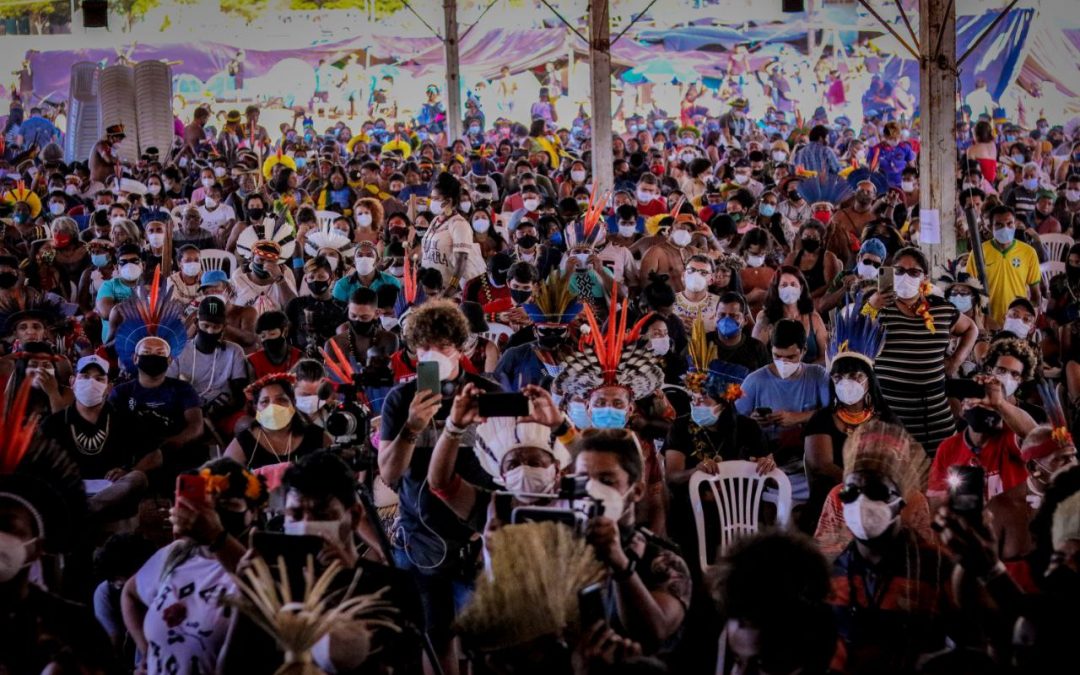
23/Aug/2021
Fotos: @scotthill / Aty Guasu
More than 5,000 indigenous people from all regions of Brazil are gathered in Brasilia to claim their rights
The second day of the Struggle for Life Camp began with the presentation of the indigenous delegations gathered in the camp. At this moment, more than 4,000 indigenous people, from 117 peoples from all regions of Brazil, are present at the Esplanada dos Ministérios, in Brasília. This morning, in a presentation of indigenous cultures, the delegations had the opportunity to exhibit their traditional dances and songs, reinforcing the cultural ancestry shared between the peoples.
In the afternoon, the coordination of Apib and its regional organizations had a moment to present their considerations on the challenges facing Indigenous Peoples across the country. The regional organizations that make up Apib are: Articulation of Indigenous Peoples of the Northeast, Minas Gerais and Espírito Santo (APOINME), Terena People’s Council, Articulation of Indigenous Peoples of the Southeast (ARPINSUDESTE), Articulation of Indigenous Peoples of the South (ARPINSUL), Great Assembly of Guarani Kaiowá Peoples (Aty Guasu), Coordination of Indigenous Organizations of the Brazilian Amazon (COIAB) and Guarani Yvyrupa Commission.
“It is also important to highlight that our camp has developed a series of health protocols, dedicated to reinforcing existing WHO norms, as all indigenous people who are in the camp must be vaccinated, obligatorily, in order to be able to accompany our camp. We feel pushed to be present in Brasilia, in this very desolate scenario that is being promoted both by the National Congress, but mainly by the Federal Government regarding the rights of indigenous peoples. From the 22nd to the 28th of August, in Brasília, we will fight for the rights of indigenous peoples, mainly guaranteeing the well-being of our territories.” Dinamam Tuxá, Coordinator of the Articulation of Indigenous Peoples of Brazil.
Indigenous Peoples of Brazil Receive International Support
The camp was visited by a Progressive International delegation, an articulation that brings together human rights organizations, political parties, unions and other institutions from the progressive field from several countries. The delegation was welcomed by representatives of the Munduruku and Kayapó peoples, who took advantage of the meeting to denounce the impacts they are facing due to infrastructure projects close to their lands.
Apib’s representatives delivered copies of the International Dossier released last week to serve as an instrument of denunciation for the international community, the document brings a series of complaints about the threats and violence perpetrated by the Government of Bolsonaro against Indigenous Peoples.
Also today, a delegation from Apib was invited to visit the Norwegian Embassy, where they were able to deliver the International Dossier and demand support for their struggle from Ambassador Nils Martin Gunneng, and from the program officer, Mr. Kristian Bengston.
United Nations reaffirms the rights of Indigenous Peoples in Brazil
Francisco Cali Tzay, UN Special Rapporteur on the rights of indigenous peoples today called on the Supreme Court (STF) to guarantee the rights of indigenous peoples to their lands and territories, and to reject a legal argument promoted by commercial agents with the aim of explore natural resources in traditional indigenous lands, referring to the Milestone thesis (tese do Marco Temporal).
“Accepting a timeframe doctrine would result in a significant denial of justice for many indigenous peoples who seek recognition of their traditional land rights. According to the Constitution, indigenous peoples have the right to permanent possession of the lands they traditionally occupy”, said Francisco. This statement reinforces the relevance and need to defend the right of Indigenous Peoples to their territories.
Plenary of the Five Powers
At 3 pm, the Plenary of the Five Powers will take place, which will be held to promote an analysis of the situation on the legislative, executive, judiciary, popular and spiritual powers. In the evening, the Indigenous Peoples will be gathered to celebrate a Pajelança: a religious ritual to reinforce the alliance of the Peoples. After the ceremony, Mídia Índia (@midiaindia) will exhibit the video screening: “Memory and Fight”.
“This plenary talks about the five powers and is very important within the Struggle for Life camp, giving it a great meaning because it passes through the discussion of the legislature, the judiciary and the executive, and it also reminds us of the fourth power, which are the masses, which is the people, the Brazilian nation as a whole, not only the indigenous peoples, but the Brazilian people, which is the fourth power. And then we talk of the fifth power, being the spiritual one. The divinities rules our lives, rules the communities, gives strength in times of difficulty and in the face of invasion, miners, loggers, against bills and ordinances, against all human ailments and spiritual, also against the pandemic and the diseases” Marcos Sabaru, Assessor policy of Apib.
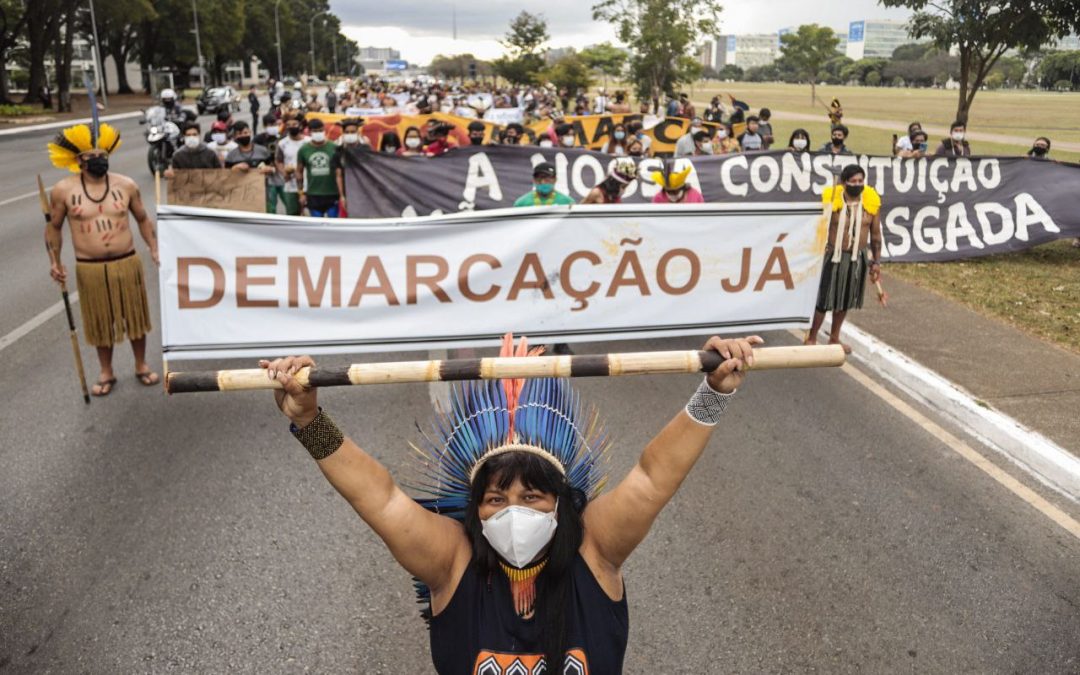
20/Aug/2021
Mobilization calls for indigenous people already vaccinated and counts with health protocols against Covid-19, in Brasilia
The Articulation of Indigenous Peoples of Brazil (Apib), associated with all its regional organizations, inaugurates this Sunday (22) the national mobilization ‘Struggle for Life’, in Brasília. The activities, which will last until the 28th of August, intend to defend the indigenous peoples rights and to promote activities against the anti-indigenous agenda that advances into the National Congress and the Federal Government. The mobilization will also focus on the trial about the Milestone Thesis (Marco Temporal) by the Brazilian Supreme Court (STF), which is expected to be resumed on August 25th and may define the future for indigenous land demarcation.
The indigenous movement constantly denounces the increase of violence against indigenous peoples inside and outside their traditional territories. Apib and all its regional grassroot organizations disseminate this information to the press, on social media and formalized complaints in national and international legal instances. On the date that marks the International Day of Indigenous Peoples, August 9, Apib presented an unprecedented statement before the International Criminal Court (ICC) to denounce Bolsonaro’s government on the crimes of Genocide and Ecocide.
“We cannot remain silent while facing this violent scenario. It is not only Covid19 virus that is killing our people and that is why we decided once again to go to Brasília to continue fighting for the lives of indigenous peoples, for the Mother Earth and for the future of humanity”, emphasizes Sonia Guajajara, one of Apib’s executive coordinators.
The mobilisation previews seven days of activities in the federal capital, with an intense schedule of plenary sessions, political audiences within Federal Government bodies and embassies, marches and public demonstrations. During this period, indigenous people from all regions of Brazil will be camped at Praça da Cidadania.
The camp will have an intense program of political discussions and cultural events. All activities have a collaborative communication team formed mostly by indigenous people. “It is necessary to give visibility and amplify the voices of the indigenous movement as a whole. In this scenario of many threats, communication plays a key role and we will be joining forces in this camp”, emphasizes Erisvan Guajajara, Media India coordinator.
Health care
The Struggle for Life Camp has developed sanitary protocols dedicated to reinforcing all existing and recommended norms for combating Covid19. The camp’s health team includes indigenous professionals and count on the support of the Brazilian Association of Collective Health (Abrasco), the Oswaldo Cruz Foundation, the Indigenous Health Clinic of the University of Brasília (Asi/UNB) and the University Hospital of Brasília (HUB).
“The health recommendations begin from the moment the delegations organize themselves to leave their territories. Apib proposes the invitation of people who already have their full vaccination coverage,” explains Dinamam Tuxá, one of Apib’s executive coordinators.
The first day of the camp (22) is dedicated to the arrival of the delegations and to carry out mass testing for Covid-19 as one of the sanitary protocols for the mobilization.
On Monday (23) the activities are dedicated to political updates with leaders across the country. ‘The Five Powers’ is the name of the plenary that will be held to promote an analysis of the current situation on the legislative, executive, judiciary, popular and spiritual powers. On this day, rituals and audiovisual exhibitions are also planned.
Future
The most central agenda of the Struggle for Life mobilisation is related to the trial by the Brazilian Supreme Federal Court (STF), which is expected to be the most important process of the century for the lives of indigenous peoples. The Court will analyze the repossession action filed by the government of Santa Catarina against the Xokleng people, referring to the Ibirama-Laklãnõ Indigenous Land (TI), where the Guarani and Kaingang peoples also live.
Under the status of “general repercussion”, the final decision made by the trial will serve as a guideline for the federal government and all instances of Brazilian justice system, as well as a reference to all processes, administrative procedures and legislative projects regarding the indigenous land demarcation procedures.
“Indigenous peoples experience a deeply adverse political context under Bolsonaro’s administration, the first president elected with a declared position against the indigenous peoples. As soon as he started his government, he signed several acts that hurt the Constitution and International Treaties that protect indigenous communities and their territories. It is important to note that, in this context of pandemic, it is essential to reflect on the relevant role the traditional territories play to keep humanity’s equilibrium. So, the indigenous lands, besides protecting the indigenous peoples’s ways of life, are a national and public heritage, which contributes to keep the climatic balance”, emphasizes Eloy Terena, Apib’s juridic coordinator in his article on the Supreme Court judgment (read the full text here)
In this sense, the schedule for the Struggle for Life camp on August 24th and 25th is dedicated to discussions, acts and manifestations related to the trial, in support of the Supreme Court justices and against the Milestone Thesis (Marco Temporal).
The days following the trial will give space to debates related to the 2022 elections and the strengthening of the support networks for the struggles of indigenous peoples. The departure of all delegations is scheduled for the 28th of August.
Check out some schedule details here
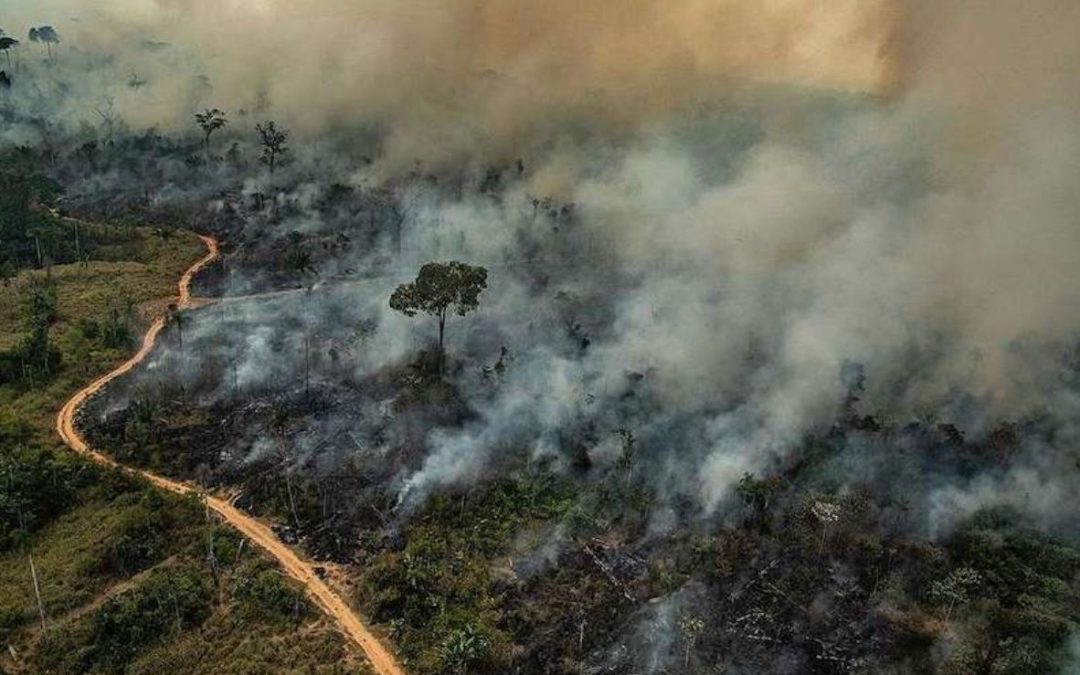
19/Aug/2021
Bills being processed in the Brazilian Congress, with irreversible consequences to the Amazon forest and indigenous peoples, could bring serious risks to the operations of financial institutions. An alert from the Coalition and other partners adds to the agenda of denunciations by indigenous peoples.
Brasília, August 19, 2021 – In a letter sent today to 80 international and Brazilian financial institutions, Forest & Finance Coalition, together with the Association of Indigenous People of Brazil (APIB), the Climate Observatory, and 45 allied organizations, warn about the risks of investments in Brazil in light of a suite of legislative changes being currently pushed in the Brazilian Congress. If approved, these bills will result in irreversible consequences for the protection of critical ecosystems such as the Amazon rainforest and the guarantee of the rights of Indigenous peoples, posing serious risks for many financial institutions operating in Brazil.
The coalition’s alert aims to pressure these financial institutions to publicly and forcefully position themselves against this regressive agenda, spur change within the industry and warn companies that operate in Brazil and rely on their financing.
“The Forests and Finance Coalition has been pressuring financial institutions for some time to take action in relation to their investments that threaten forests and the rights of Indigenous peoples in Brazil. These measures include clear criteria for excluding companies that commit these violations from its portfolio and the adoption of policies against deforestation and for the protection of the rights of Indigenous peoples,” says Merel Van der Merk, coordinator of the Coalition. “But faced with a threat of this magnitude to the legal protection of the environment, we need concrete action now, a very clear position that these institutions will not be accomplices in further destruction, deforestation and degradation of Brazilian ecosystems and the violation of rights of indigenous peoples,” she highlighted.
Among the legislative threats described in the letter are Bill 2633/2020, also known as the Land Grabbing Bill (PL da Grilagem); Bill 3729/2004, which loosens the rules for environmental licensing in Brazil – both approved by a great majority in the Chamber of Deputies, awaiting consideration in the Senate; Bill 191/2020 which frees up mining and other extractive activities within Indigenous lands and removes the veto power of these communities; Legislative Decree 177/2021, which allows Brazil’s withdrawal from Convention 169 of the ILO; and Bill 490/2007, which may revert constitutional protections to Indigenous Territories, making new demarcations unfeasible and threatening the ones already in place.
The letter reinforces the agenda of mobilizations by Indigenous peoples and organizations between the months of August and September in Brazil. On Monday, August 16t, the Association of Brazil’s Indigenous Peoples (APIB) published an international dossier of complaints to draw attention to the offensive against Indigenous peoples and the environment led by the Bolsonaro government and its allies. APIB signed the letter led by the coalition, in addition to 45 other organizations.
“With this letter, we join hundreds of Indigenous leaders and environmental advocates that are now marching to Brasília to defend their territories and forests. If approved, these measures will have catastrophic results not only for Indigenous people but to the entire social and environmental protection apparatus in Brazil – which is already dismantled by the current administration – and because of the rainforest’s role in our climate, for the world,” said Rosana Miranda, campaign adviser at Amazon Watch, member of the coalition. “These changes threaten the financial sector itself, as it represents an increase in the social, legal, environmental, and climate risks involved in operating in Brazil. They need to act,” she concluded.
About the Forests and Finance Coalition
The Forests & Finance (F&F) is an initiative of a coalition of campaign and research organizations including Rainforest Action Network, TuK Indonesia, Profundo, Amazon Watch, Reporter Brasil, BankTrack, Sahabat Alam Malaysia, and Friends of the Earth US. The coalition seeks to prevent financial institutions from facilitating the common environmental and social abuses of forest risk commodities. They advocate greater transparency, specific financial sector policies, systems, and regulations.
The initiative’s database can uncover the links between major banks, investors, and companies at risk of deforestation, and present case studies involving deforestation and human rights violations linked to bank investments and financing. Financial institutions can access more than 300 companies directly involved in the supply chains of various commodities whose operations affect tropical forests in Southeast Asia, Central and West Africa, and Brazil.
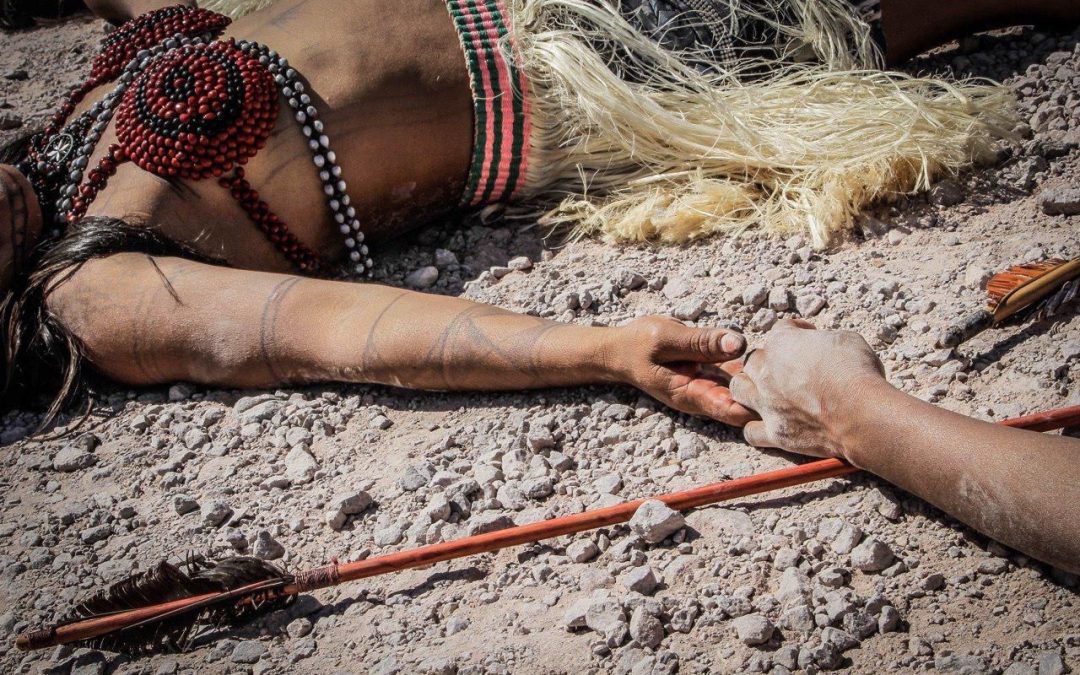
16/Aug/2021
photo: Juliana Pesqueira / Proteja Amazônia
ACCESS THE DOCUMENT HERE
BRASÍLIA, August 16, 2021 – The Articulation of Indigenous Peoples of Brazil (Apib) launches today (16) its International Complaints Dossier. The document brings together a series of data and information that demonstrate that Bolsonaro selected indigenous peoples as enemies of his government, and turned his hate speeches into state policy. The document also relates Bolsonaro’s actions and omissions with the increase in cases of violence and conflict in indigenous territories.
The initiative is part of Apib’s strategy to expand international knowledge about the emergency situation experienced by Indigenous Peoples in Brazil. Last week, the Articulation filed a complaint in the International Criminal Court in The Hague, calling for the investigation of Bolsonaro for crimes of genocide and ecocide. Now, the dossier presents a perspective of broad analysis, to expose to the world the anti-indigenist agenda that is advancing in Brazil.
As an excerpt from the Dossier, the agenda of violence against peoples is “orchestrated with the direct participation of the Executive Branch, fastly advances in the National Congress and rounds up decisions that pass through the hands of the ministers of the Brazilian Supreme Court, the Federal Supreme Court (STF), and also by other instances of the Judiciary.”
The document will be released at an online event, which starts at 12:00 pm (Brasilia time), with the participation of Sônia Guajajara and Dinamam Tuxá, from APIB’s executive coordination, Eloy Terena, coordinator of the institution’s legal department. Ana Patté, from the Xokleng people of Santa Catarina, also participates in the event to report the trajectory of conflicts in the Ibirama-Laklãnõ Indigenous Land, whose case will be analyzed by the Supreme Court on August 25 and has a “general repercussion” character, which makes this an impactful decision for the future of Indigenous Lands demarcation in Brazil.
WATCH THE LAUNCH ACTIVITY:
APIB Youtube Channel
APIB Facebook Page











